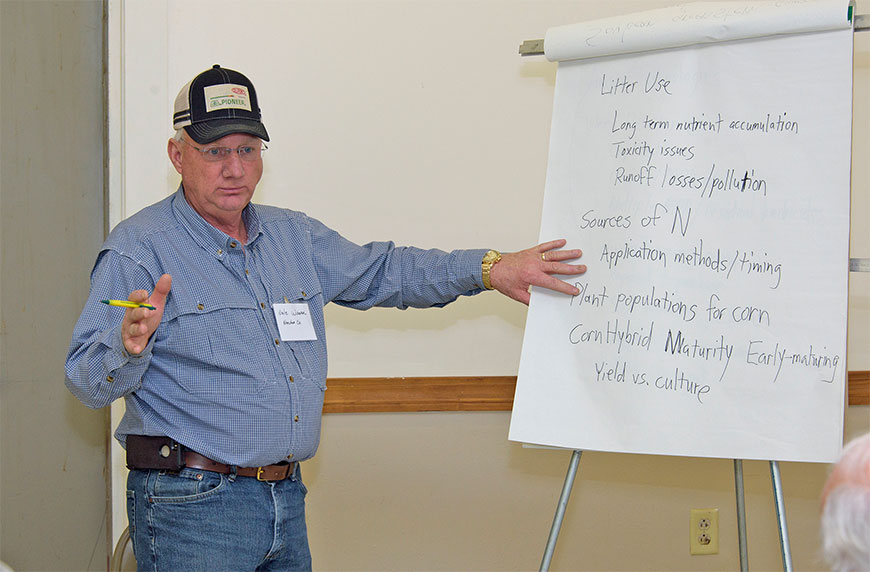News
The information presented on this page may be outdated. It may refer to situations which have changed or people who are no longer affiliated with the university. It is archived as part of Mississippi State University's history.
MSU celebrates effective partnerships with producers

Mississippi State University specialists and researchers met with northeast Mississippi agricultural producers in Verona on Feb. 16 to provide updates and hear requests for future programs. (Photo By: Kevin Hudson)
2/17/2017
By: Linda M. Breazeale
Jane Parish, newly appointed head of the North Mississippi Research and Extension Center, said the annual Producer Advisory Council meeting reflects the close relationship between area producers and the MSU Division of Agriculture, Forestry and Veterinary Medicine.
"They represent a variety of commodities, agricultural enterprises and natural resources," Parish said. "It's really a partnership— a good way for them to engage with us, and we get a lot of great ideas. It helps us to know what to focus on with our Experiment Station and our Extension programs."
Representatives from 15 agricultural commodities met with Extension agents and Mississippi Agricultural and Forestry Experiment Station researchers to learn about studies that are underway and to hear the latest recommendations in their fields. In return, producers expressed some of their greatest challenges or concerns that MSU could help address.
Dale Weaver of Noxubee County took part in the grain crops break-out session. He farms corn, soybeans and cotton near Prairie Point and has been attending these meetings for about six years.
"What we are doing is steering research. It needs to be applicable to what we are doing on the farm—something that will benefit producers," Weaver said.
Some of the issues that came from Weaver's group included the need for more information on the economics of cover crops, which are overwintering plants that protect water quality, prevent soil erosion or provide soil fertility benefits. The group also requested more studies on herbicide use on soybeans and the use of poultry litter as fertilizer.
Other commodity groups also made a variety of requests.
Apiculture, or beekeeping, producers want MSU to help facilitate regional meetings. They want to use technologies, such as webinars, to help improve their abilities. The group requested a Master Beekeeping Program that would further train beekeepers, as well as the addition of a bee component to the 4-H Youth Development Program.
Aquaculture producers requested continued help with management of three specific pathogens affecting their industry: Aeromonas, a bacterial pathogen that causes the most trouble; and two parasites, Bolbophorous and Hennyguya.
Beef producers were represented by Dr. Nancy Jackson, a large-animal veterinarian and incoming president of the Mississippi Cattlemen's Association. She said the beef commodity advisory board asked for research on cattle adapted to fescue, more information on marketing fed beef, and for research and extension programs related to financial efficiency and sustainability related to cow size, forages, and budgeting.
Cotton producers consider education on new herbicide technologies a top priority. Producer representative Joe Camp also requested more research on benefits of no-till and cover crops in cotton.
Dairy producer Jeremy Graham said youth issues top his commodity group's list.
"We need more emphasis on dairy youth activities to retain and develop the next generation of dairy producers," Graham said. "We also need new and improved dairy youth publications for 4-H activities like dairy judging and dairy bowls."
Horses need to be respected for the economic value they bring to the state, according to the equine group. Producers requested horsemanship clinics for young people, promotion of horse projects in 4-H, and a return to live horse auctions at MSU, as opposed to online sales.
Forestry producers requested information to educate local elected officials about the benefits of forestry and logging activities. They also requested guidance on teaching forestry producers to interact with economic developers to attract industry. The group wants more information for landowners who need to thin timber stands.
Goat and sheep producers requested assistance developing marketing strategies. Additionally, they requested guidance for parasite control and tools to address forage and nutrition concerns.
Ornamental horticulture producers requested pest and disease update bulletins, as well as monthly consumer information to bridge the gap between producers and consumers. They requested resources to help independent garden centers compete with "big box stores."
Peanut producers requested studies on early-maturing varieties with disease tolerance and resistance. They want MSU to continue with peanut fungicide research, and they requested a pocket reference chart for peanut fungicides.
Sweet potato grower Jamie Earp said producers need help to avoid skinning and postharvest breakdown. They want help expanding the number of growers who produce certified seed. Because growing sweet potatoes is labor-intensive, producers asked MSU to help them with economic assessment on labor issues.
Swine producers remain concerned about feral hog control. They also want MSU to help make hobby farmers or families more successful in raising pigs for local consumption.
Turf growers asked for flexible soil test recommendations, more research into dollarspot in areas fertilized with slow-released nitrogen, additional publications and advice on irrigation timing and design, and continued administrative support for the Deep South Turf Expo.
Fruit, vegetable and nut growers requested field and high-tunnel tomato variety research, as well as guidance on irrigation, nutrient management, and issues related to the economics and timing of fertilizer placement under plastic. Growers want more information on reduced tillage using methods such as silage tarps, straw mulching and pine needles.
The North Mississippi Producer Advisory Council is held annually on the third Thursday in February in Verona. Counties participating include Alcorn, Benton, Calhoun, Chickasaw, Choctaw, Clay, Itawamba, Lafayette, Lee, Lowndes, Marshall, Monroe, Noxubee, Oktibbeha, Pontotoc, Prentiss, Tippah, Tishomingo, Union, Webster, Winston and Yalobusha.
View More News